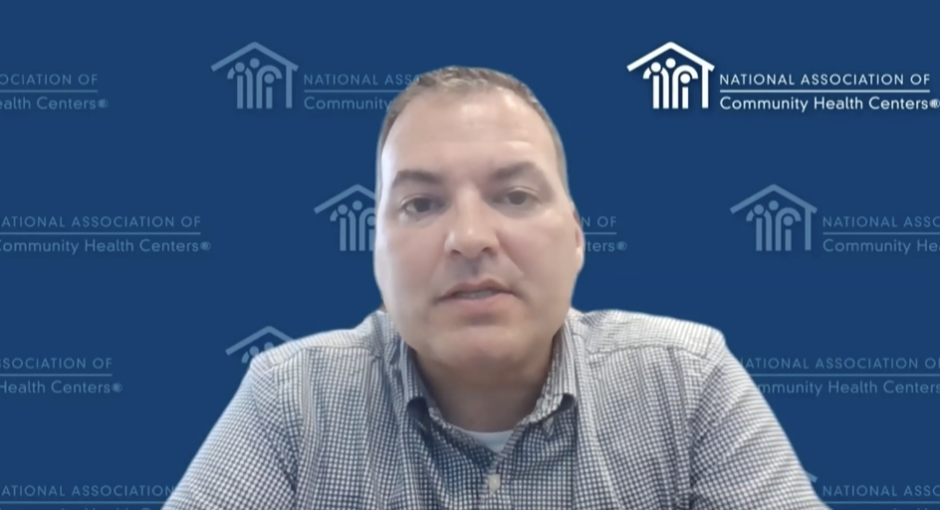The National Association of Community Health Centers “would love to see” Congress pass legislation by the end of this year that stops drug makers from restricting 340B contract pharmacy arrangements and stops pharmacy benefit managers from taking covered entities’ 340B savings, a NACHC senior executive said yesterday.
“The big thing that we are trying to do is raise the visibility and the importance level of 340B to health centers with policy makers at all levels,” NACHC Senior Vice President of Research and Policy Joe Dunn said during a June 13 news conference to release survey findings about how health centers use 340B contract pharmacies and savings.
If enacting 340B legislation this year is impossible, Dunn said, “then we’re going to continue to push [the message that] health centers are on the front lines of the COVID-19 pandemic and really demonstrated their value in the community, but they’re really struggling right now because of these unilateral decisions by PBMs and drug manufacturers to restrict [340B] access.”
NACHC Board Chair Mike Holmes, CEO of Scenic River Health Services in Minnesota, said “we’re hopeful that Congress will take up” the PROTECT 340B Act, which would prohibit PBMs and health insurers from imposing different rules or reimbursement terms on 340B entities than those imposed on others. The bill would also require the U.S. Department of Health and Human Services (HHS) to establish a neutral third-party clearinghouse to resolve instances of duplicate discounts in the Medicaid area.
A clearinghouse chosen by HHS, rather than by pharmaceutical manufacturers, is considered by 340B providers as a fairer arbiter than the current system utilized by several drug companies that have placed restrictions on the 340B discounts in the contract pharmacy setting. In addition to being overseen by a vendor chosen by the government, the claims submissions requirement in the Protect 340B Act would be limited to Medicaid. 340B ESP, the clearinghouse chosen by at least 10 of the drug makers that are restricting 340B access, requires 340B covered entities to submit pharmacy claims data from all payers, not just Medicaid.
The Protect 340B Act, which was introduced last year by Reps. Abigail Spanberger (D-Va.) and Rep. David McKinley (R-W.Va.) continues to gain support and now has 96 co-sponsors.
Looking to Congress to Resolve Contract Pharmacy Impasse
“We’re also looking for new legislation from Congress that would specifically stop the attacks on shipments [of 340B drugs] to contract pharmacies by expressly including contract pharmacies in the 340B statute,” Holmes said. He also urged the Bidden administration to act.
Holmes criticized “the aggressive behavior of drug companies and drug middlemen around the 340B program where they cut access to the program and pick-pocket savings that should be going to America’s health centers.”
“Six drug companies have chosen to restrict access to life-saving medications for the most vulnerable Americans because they don’t like the fact that the program has grown through the use of contract pharmacies,” Holmes said. Without 340B contract pharmacy arrangements, it would be harder for health center patients to afford and receive prescription drugs, he said.
“The actions by these drug companies … can be boiled down to simple corporate greed,” Holmes said.
Sue Veer, President and CEO of Carolina Health Centers in South Carolina, emphasized the urgency of Congress passing laws that address drug manufacturers and PBMs’ 340B actions.
“There are health centers that are literally hemorrhaging resources that are absolutely vital to keeping their doors open in communities that don’t have any other source of primary care for the low income and uninsured population.” Veer said. “The level of urgency just continues to escalate.”
She said 340B health centers are being forced to make hard choices over what services to discontinue and what practice sites to close.
Veer noted that heath centers rely on contract pharmacies to fill the gap when, for example, drug courier services are insufficient to get medicines to rural patients in a timely manner. “The health center community has come to recognize that pharmacy is a core component of the primary care medical model, without which we would be unable to achieve the remarkable outcomes that we’ve become known for,” she said.
Yet integrating the pharmacies into health centers’ care is only possible through 340B, she added. The program also covers the gap for very low-income patients who can’t afford their medicines even with the 340B discount, Veer noted. “It can be the difference between disease and health or between life and death,” she said.
The 340B program also pays for services such as nutrition, suicide prevention, substance abuse, Veer noted.
“Without the 340B program, we would not have a pharmacy department,” said Kemi Ali, CEO of the Trenton, N.J.-based Henry J. Austin Health Center. “To have that assault [on the program] at the height of a global pandemic is just unconscionable, considering the services that we were trying to provide, the limited resources we had, and the sheer magnitude of the need that was in our communities.” She said 340B pays for services at her facility including patient navigators and community health workers.


